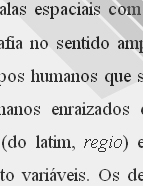

................................
In an innovative vein, Alberto Sampaio (1841-1908) stood out with his study, As “villas” do norte de Portugal [The “villages” of northern Portugal], which was published in several instalments in the journal Portugalia: materiaes para o estudo do povo portuguez , edited by Ricardo Severo, in Porto. A profound connoisseur of the Minho countryside, he developed a study of economic and social history to understand the origins of the land occupation typical of that region of the country, the organisation of society and the way of life of rural populations. To this end, he went back to the Roman period and the transformations of the early Middle Ages which, in his interpretation, shaped the fundamental characteristics of the region. Published in the early 20th century, the work remained for a long time an isolated example in the context of regional and local historiography due to the historical-sociological nature of its approach and the way in which it integrates geography and ethnology into the explanatory framework it weaves about the settlement and organisation of rural areas in the north of the country. In two other scientific fields, regional studies were innovative and very productive during the period under review: ethnography and human geography. In both fields, the best works and authors show a concern with the origin and historical transformations of the realities observed in the present. The historical reference appears in the works of anthropologist Jorge Dias (1907-1973) on agrarian communitarianism and agricultural tools, but it is essential in the studies of geographer Orlando Ribeiro (1911-1997), whose example bore fruit in a line of research on “Historical, Regional and Local Geography” at the Centre for Geographical Studies of the Faculdade de Letras da Universidade de Lisboa [School of Arts and Humanities of the University of Lisbon], which he founded in the early 1940s. In this regard, mention should be made of the works of Raquel Soeiro de Brito, António de Brum Ferreira and Carlos Alberto Medeiros, dedicated to various islands of the Azores. As far as the mainland is concerned, the work of Carminda Cavaco on the eastern Algarve and that of Maria Alfreda Cruz on the southern margin of the Tagus estuary are noteworthy. Jorge Gaspar continued along the same interdisciplinary and historical-geographical lines, particularly in his study on “Os portos fluviais do Tejo” [The river ports of the Tagus] (1970). In the 1960s, signs of a renewal of regional and local historical studies began to appear in Portugal under the influence of more specialised work carried out in academia. The best example came from abroad with Albert Silbert’s innovative work on the agrarian history of the Beira Baixa and Alentejo regions, presented at the Sorbonne in 1963 as part of his doctoral thesis ( Le Portugal méditerranéen à la fin de “Ancien Régime” , 1966).
This work is financed by national funds through FCT - Foundation for Science and Technology, I.P, in the scope of the projects UIDB/04311/2020 and UIDP/04311/2020.
